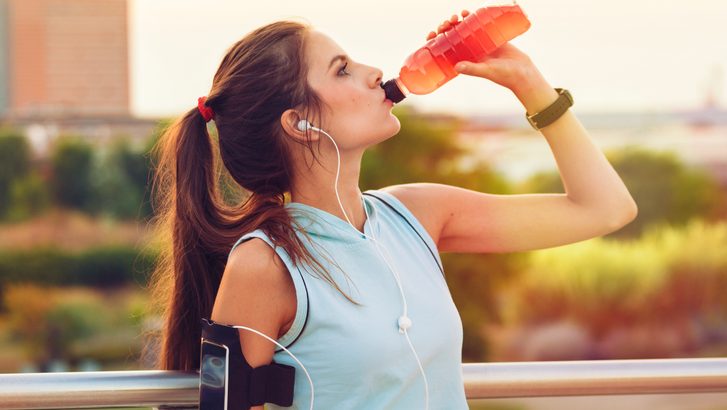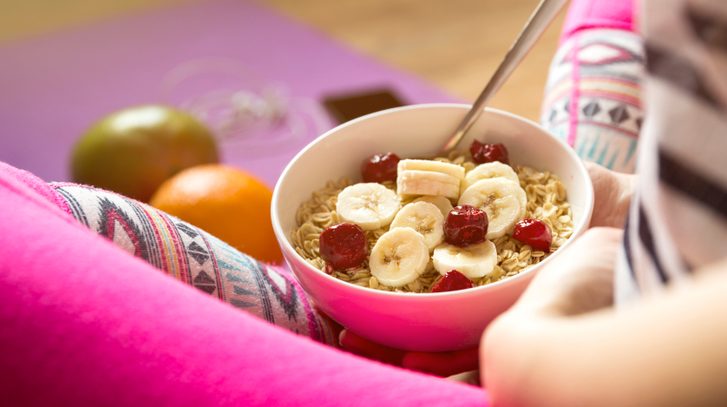
Here’s What You Should Eat Before, During, and After Your Run for Best Performance

It’s no doubt that running can help you maintain a lean, toned physique. Unlike going to the gym that requires a membership fee, which you may use as an excuse not to be active, running doesn’t come with a price tag, in fact, it is absolutely free.
All you need is the will power, perhaps some good music, and energy to get up and put on your running shoes. But experienced runners would know that nutrition plays an important role in ensuring that you give your best in every cardio session.
This is why it’s important to know how to fuel your body the right way, which foods to each and when to eat them. Beginners usually find themselves asking whether they should eat before the run or after and the answer can differ from one individual to another. However, bear in mind that hydration and nutrition can greatly affect how you perform your daily activities.
A common worry among runners and joggers is if they would eat before, during, or after a jog or run, but this would greatly vary on how long or how far you plan to cover.

Christopher Edwin Nuzzaco/Shutterstock
You don’t have to eat before a short run
Before
If you’re planning to cover a 3 to 4-mile distance, you can run on an empty stomach, Nuun sports nutritionist Vishal Patel explained. This is because your body has ample glycogen stores to fuel your workout without getting fatigued or dizzy.
While you really don’t need pre-run fuel, you definitely should keep in mind that you need to hydrate because as your body heats up during the run, it loses fluids. Dehydration can seriosuly affect your progress hence it’s advisable to drink an 8-ounce glass of water before you head out on a run and keep a bottle handy just in case.
If you plan to run for more than 4 miles or are training for speed, you should fuel your body with a pre-workout snack for extra energy.
Eastern Oregon University nutrition and exercise physiology assistant professor Kyle Pfaffenback advises 50 to 60 grams of carbohydrates like banana and oatmeal to be eaten 1 and a half to 2 hours just so your body can digest the food and can absorb the nutrients.
For sprint intervals and tough tempo workouts, carb-loading is recommended the night before you put your body to the test. A heavy dinner like potatoes, lentils, rice, quinoa, or pasta paired with protein and vegetables can jolt the glycogen levels that you can use for the following day.

alessandro guerriero/Shutterstock
Gargling and then spitting a sports drink can trick your mind
During
For runs shorter than an hour, the water in your body should be sufficient to keep you hydrated throughout the entire activity, unless it’s a hot, humid day, in which case you might need to chug on a sports drink with electrolytes to help fluid retention and oxygen reception. Vishal explained that getting the minerals from fluids is better than from food because it reaches the muscles faster.
But for any intense physical activity that lasts more than an hour, you should munch on 30 to 60 grams of carbs after the first 60 minutes to replenish your glycogen levels and power through the remaining distance. Toward the end of your session, rinse a sports drink in your mouth and spit it out – according to a study, this will trick your mind to recruit more muscles.

Arturs Budkevics/Shutterstock
Eating after a workout is vital
After
Eating properly after a good run is also essential. Vishal points out that you get stronger during your recovery period as you stress your muscles during the workout. Grab a meal composing of 2:1 or 3:1 of carbs to protein depending on the intensity of your workout.
More in Health & Well-being
-
`
Here’s Everything You Need to Know About Open Relationships
An open relationship is a consensual arrangement where partners agree to engage in romantic or sexual relationships with other people. Unlike...
June 6, 2024 -
`
Explore the Multifaceted Goals of Meditation
What is the goal of meditation? If you have ever found yourself asking this question, you are not alone. Meditation has...
May 31, 2024 -
`
When is National I Love You Day Celebrated? Mark Your Calendar
Life can get hectic, and sometimes amidst the daily grind, we forget to express our love and appreciation for the phenomenal...
May 23, 2024 -
`
When’s the Best Time of Day to Fish?
For any angler, a successful fishing trip hinges on several factors. But one of the most crucial elements is timing. Knowing...
May 14, 2024 -
`
What Mental Illness Does Britney Spears Have? Discovering the Answer
Britney Spears, a name that resonates with millions around the globe, goes far beyond the glitz and glamour of her stardom....
May 7, 2024 -
`
Here Are Some Easy Ways To Say No To Unrealistic Expectations In Your Relationship
If you are in a relationship, you should constantly work on improving it. Some early lovebirds fall in love too quickly...
May 3, 2024 -
`
Therapy? Medication? What Are the Treatments for PTSD
Post-Traumatic Stress Disorder (PTSD) is a common after-effect of traumatic events. It can be a debilitating condition, but the good news...
April 25, 2024 -
`
Courting vs Dating – Which Relationship Path is Right for You?
In today’s fast-paced world, the terms ‘courting’ and ‘dating’ often swirl around in conversations about relationships. While some people may use...
April 23, 2024 -
`
Essential Mexico Travel Tips for a Seamless Adventure
Mexico, a land of vibrant culture, breathtaking landscapes, and mouthwatering cuisine, beckons travelers from across the globe. But before you embark...
April 16, 2024















You must be logged in to post a comment Login